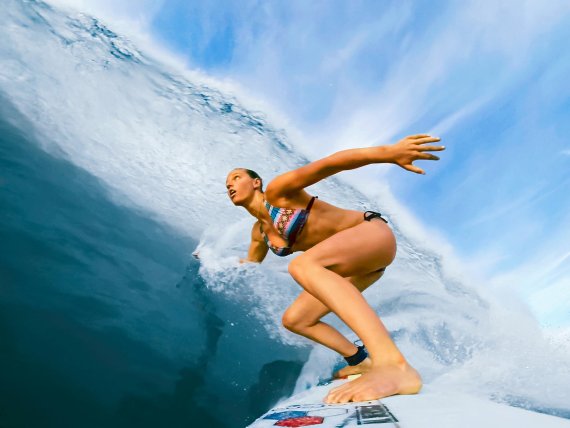
GoPro – the modern fairytale:
The dotcom bubble had just burst, leaving his internet company broke. Californian Nick Woodman, then in his mid-twenties, needed a break. It has now been 13 years since Woodman sought diversion by surfing in Australia, where he wanted to document his progress on the surfboard with a camera.
The creative juices started flowing when Woodman was confronted with the poor quality of waterproof disposable cameras, finding it particularly annoying that he had to come up with makeshift methods of attaching them to his body using rubber bands. He had the idea of creating a compact, waterproof camera capable of withstanding a lot and capturing the best sporting moments. Woodman moved back in with his parents, worked meticulously on prototypes day and night and ultimately founded GoPro.
Some ten years later, his invention is now a product many athletes use daily. Whether it’s used for surfing, snowboarding or skating, on your head, your body or your board: the small camera captures sporting memories – in professional quality.
The company’s revenues and profits continue to grow by double digits; in 2014, the company posted profits of $35 million. The camera experienced perhaps its biggest moment to date three years ago when Austrian stunt man Felix Baumgartner jumped from a balloon to parachute from the stratosphere to Earth while five GoPros strapped to his suit filmed the spectacle.
GoPro was listed on the NASDAQ technology stock exchange in New York in 2014. Within three months the value of the stock rose from $24 to more than $91. Nevertheless, Woodman was forced to recognize that the rules of the stock market sometimes appear paradoxical.
Despite the company’s success, the stock collapsed in 2015, its value more than halving. Nick Woodman’s ingenuity is now more in demand than ever. The Multicopter camera drone is set to hit the market in the coming year, bringing GoPro back on track on the stock market as well.
Freeletics – kick the butt of couch potatoes:
Run through Munich’s Maßmannpark and do push-ups on the roof terrace of a student dormitory in Berlin. The app Freeletics has been breaking more than six million users into a sweat since 2012 with fitness exercises and motivational messages.
Millions of fans already have the app – and day after day, they are finding open spaces to reach their physical limits together. The idea: Unlike at your average gym, there are no dumbbells, step machines or leg presses. Your own body serves as your workout equipment.
Three college graduates, Andrej Matijczaj, Joshua Cornelius and Mehmet Yilmaz, founded Freeletics three years ago and still hold all shares in the company. This despite the fact that a number of well-known investors have allegedly already expressed interest in joining together with the company. And that’s not all the fittest German app is attracting.
Runtastic – from the digital to sports shops:
from a small Austrian start-up to a multi-million dollar deal with Adidas – all in only six years. The founders of Runtastic continued building upon what they had to offer year upon year, garnering attention from wealthy investors in the process. It all began with an app that Florian Gschwandtner, Christian Kaar, René Giretzlehner and Alfred Luger made for a
college project. In 2009, they founded the company Runtastic in Pasching, Austria. Their app provides runners, cyclists or athletic walkers with information on their mileage and calories burned. By 2013, Runtastic’s apps had been downloaded more than 46 million times. Axel Springer AG then secured a majority share in the digital start-up.
And Runtastic continued investing and diversifying: The company has also been producing hardware since 2014. The Runtastic Orbit, a wearable that tracks users’ fitness activities, exercise behavior and sleep helps users lead healthier lives. It seems Adidas liked this idea. In August, the group bought Runtastic for 220 million euros.
Tentsile – the adventure gadget:
Many children both young and old dream of a comfy treehouse with exceptional views. And Alex Shirley-Smith was no different. As a young boy, he became entranced when he saw a TV documentary on the rainforest. He decided to someday become an architect and build treehouses himself. Just under 20 years later in 2012, he presented the prototypes for his Tentsile in London: a tent that can hang between trees.
But it is not just childhood dreams the founder is aiming to fulfill with his invention; he wants to enable people to camp everywhere imaginable. If the subsurface is even, adventurers can also set up the tent on the ground. If roots and stones make a good night’s sleep impossible, a refuge can be built one level up between the trees. Its stable straps ensure a firm hold and hammock atmosphere.
The company is quite clearly striking a nerve: Although the company is now only three years old, its product is already being sold by many outdoor retailers around the world. In 2015, Tentsile won ISPO BRANDNEW. However, the tree tent is not intended for use among the treetop canopies: The manufacturer recommends hanging it at a height of approximately 4 feet.
Tickaroo – the shortest route to the home team:
something sought by sports fans everywhere. Work, important appointments or trips abroad sometimes get in the way when all you really want to do is watch your favorite team play on TV.
Live tickers come in handy in such cases by continuously updating you on the game’s progress on your PC or the app. Something that has been available to the professional sports industry for years is now reaching its limits with updates on the Cajunland Volleyball Club in New Orleans or the Alexandria Hustle Rising Stars in Virginia.
Tickaroo, an online company, works on live ticker app that shows sports results from the amateur arena. This gives fans and clubs the chance to receive live updates of scores, photos and videos live from the stands for all those who were unable to make it to the stadium or soccer field. In October the Nuremberg-based Olympia-Verlag, the publishing house behind Kicker magazine, declared it would support the start-up with an investment of several million euros.
 SportsTechUnlocking the Future of Sports with AI
SportsTechUnlocking the Future of Sports with AI
- ISPO awards
- Mountain sports
- Bike
- Design
- Retail
- Fitness
- Health
- ISPO Job Market
- ISPO Munich
- ISPO Shanghai
- Running
- Brands
- Sustainability
- Olympia
- OutDoor
- Promotion
- Sports Business
- ISPO Textrends
- Triathlon
- Water sports
- Winter sports
- eSports
- SportsTech
- OutDoor by ISPO
- Heroes
- Transformation
- Sport Fashion
- Urban Culture
- Challenges of a CEO
- Trade fairs
- Sports
- Find the Balance
- Product reviews
- Newsletter Exclusive Area
- Magazine


